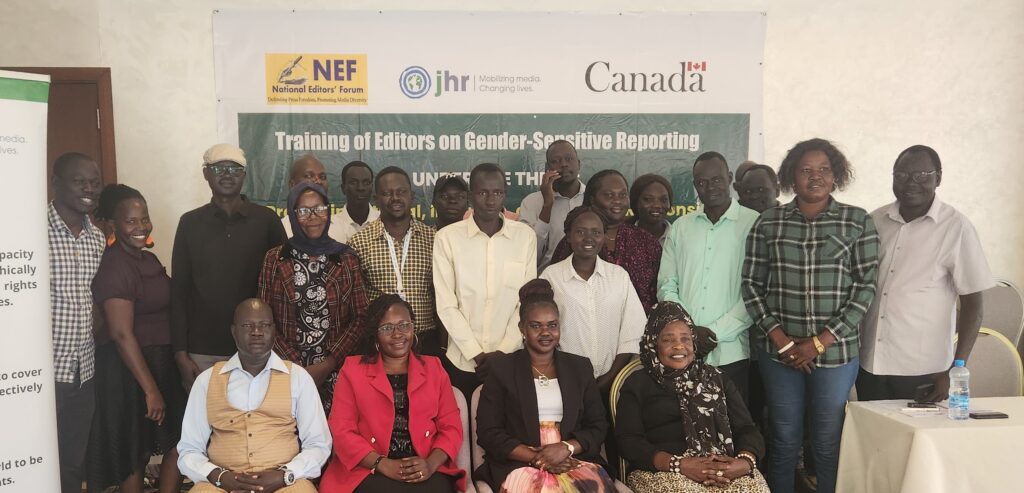The South Sudan National Editors’ Forum (NEF) on Thursday officially adopted the 2021 Gender Policy, marking what it described as a major step toward promoting gender equality and inclusivity within South Sudan’s media industry.
Speaking during a joint press conference by NEF and the Female Journalists Network (FJN) in Juba, Morris Dogga, the Deputy Secretary General of the NEF, said the policy reflects their commitment to transforming media institutions into spaces where both women and men have equal access to opportunities, leadership, and resources.
“This adoption demonstrates our recognition of the urgent need to make the media an inclusive and fair environment,” he said. “Gender balance is not only about fairness, but also about improving the quality and diversity of journalism in South Sudan.”
The new gender policy seeks to integrate gender-responsive practices across all media organizations. It outlines measures such as conducting periodic gender audits, establishing internal gender committees, and ensuring at least 35 percent female representation at all institutional levels.
Other provisions include the creation of anti-sexual harassment frameworks, flexible working schedules for pregnant and lactating mothers, paternity leave, and continuous gender training for all staff to promote awareness and accountability.
“We are setting a standard where equality and respect for women’s voices are part of newsroom culture,” Dogga stated. “This is a shared responsibility for all media partners and journalists.”
The Forum also pledged to dedicate adequate resources, such as vehicles and equipment, to support female journalists during field assignments, and to ensure editorial tasks are distributed equitably among staff.
By adopting the Female Journalists Network’s gender policy, NEF joins efforts with media owners and partners to ensure women’s perspectives are represented in editorial decision-making and media content.
“We call on every newsroom to embrace this framework as a guide for building a more inclusive and professional media industry in South Sudan,” Dogga said.
For her part, Stella Loki, Secretary General of the Female Journalists Network (FJN), called for immediate action to safeguard women in the media industry.
“Women journalists play a vital role in informing and inspiring the public across South Sudan,” she said. “Yet too many continue to face harassment, discrimination, and unsafe working conditions that undermine their safety and the integrity of our media.”
Loki urged media houses to adopt clear anti-harassment policies, create confidential reporting channels, and offer regular training on gender sensitivity and professional ethics.
“Protecting female journalists is not a favour, it is a responsibility, a professional duty, and a moral commitment,” she stressed. “Together, we can build a media environment where both women and men can thrive and serve our nation with integrity.”
By adopting the Female Journalists Network’s gender policy, NEF joins media owners and partners in ensuring women’s perspectives are represented in editorial decision-making and content across South Sudan.
Meanwhile, Mary Ajith, Program Manager for Journalists for Human Rights (JHR), commended the Editors’ Forum and the Female Journalists Network for their collaboration and commitment to addressing gender inequality.
“I’m happy with the joint statement and the editors’ commitment to eliminate sexual harassment in newsrooms,” she said. “On behalf of JHR, we will work closely with these two institutions to take this policy to the media houses.”
Ajith revealed that JHR plans to help implement the policy by engaging five to ten media houses before the end of the year, focusing on issues such as gender representation, women’s participation, and sexual harassment prevention.
“The media industry is still male-dominated, but I have seen the willingness of male journalists to support their female colleagues,” Ajith added. “If these commitments are implemented, South Sudan’s media will thrive as a true champion of gender equality.”
By adopting the Female Journalists Network’s gender policy, NEF joins media owners and partners in ensuring women’s perspectives are represented in editorial decision-making and media content across South Sudan.




